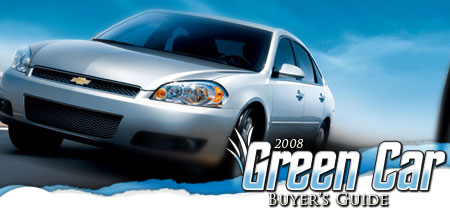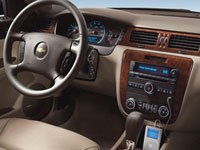|

2008
Chevrolet Impala FlexFuel
With so much attention going toward Chevy's newly revamped Malibu sedan, should there be concern about the larger, but still mid-size, front-wheel-drive Impala? No way, according to GM executives. Rather, they say, some customers who have come into showrooms to check out Malibu have moved up to Impala instead.
 |
Chevrolet Impala Interior |
2008 Chevrolet Impala FlexFuel got its update a couple of years ago. For 2008, it not only adds refinements but expands the FlexFuel capability of its new V-6 engines, adding a counterpart to the Malibu's fuel-saving hybrid version. Impala drivers now can have their choice of a 3.5-liter V-6 that's on base LS and LT models, or opt for the 3.9-liter V-6 with Active Fuel Management that's standard on the LTZ, and also on the sporty SS powered by a 5.3-liter V-8. The Active Fuel Management gains fuel savings by shutting down half of the cylinders when they're not needed, such as highway cruising. That can account for about a 12 percent fuel economy boost, according to Chevy.
The Impala, that's big without being overwhelming and checks in at a $21,650 base price, has a range of amenities for a wide variety of consumers. Among updates for 2008 are standard XM Satellite Radio capability on all models and standard StabiliTrak electronic stability control on all but LS. Seventeen and 18-inch wheels are added depending on model, and a performance suspension becomes standard on the LTZ. The 1LT Luxury Edition includes leather, OnStar Turn-By-Turn navigation, steering wheel radio control, flip-and-fold rear seat, ABS with traction control and rear spoiler. Wrapping up changes are three new metallic exterior colors: Gold Mist, Mocha Bronze and Slate.
Impala got high marks for its latest, stylish revision. While 18 city/29 highway mpg fuel economy numbers reflect the Active Fuel Management at express road speeds, and cleaner exhaust from FlexFuel models, they could differ for customers in California and the Northeast where emissions are regulated at the state rather than the federal level. Those customers would have to order state-sanctioned E85-compatible engines. |